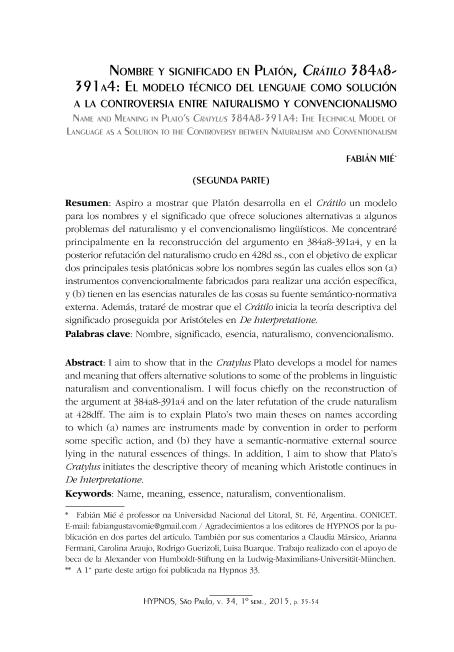Artículo
Aspiro a mostrar que Platón desarrolla en el Crátilo un modelo para los nombres y el significado que ofrece soluciones alternativas a algunos problemas del naturalismo y el convencionalismo lingüísticos. Me concentraré principalmente en la reconstrucción del argumento en 384a8-391a4, y en la posterior refutación del naturalismo crudo en 428d ss., con el objetivo de explicar dos principales tesis platónicas sobre los nombres según las cuales ellos son (a) instrumentos convencionalmente fabricados para realizar una acción específica, y (b) tienen en las esencias naturales de las cosas su fuente semántico-normativa externa. Además, trataré de mostrar que el Crátilo inicia la teoría descriptiva del significado proseguida por Aristóteles en De Interpretatione. I aim to show that in the Cratylus Plato develops a model for names and meaning that offers alternative solutions to some of the problems in linguistic naturalism and conventionalism. I will focus chiefly on the reconstruction of the argument at 384a8-391a4 and on the later refutation of the crude naturalism at 428dff. The aim is to explain Plato’s two main theses on names according to which (a) names are instruments made by convention in order to perform some specific action, and (b) they have a semantic-normative external source lying in the natural essences of things. In addition, I aim to show that Plato’s Cratylus initiates the descriptive theory of meaning which Aristotle continues in De Interpretatione.
Nombre y significado en Platón, Crátilo 384a8-391a4: el modelo técnico del lenguaje como solución a la controversia entre naturalismo y convencionalismo (SEGUNDA PARTE)
Título:
Name and meaning in Plato’s Cratylus 384a8-391a4: the technical model of language as a solution to the controversy between naturalism and conventionalism
Fecha de publicación:
04/2015
Editorial:
Pontificia Universidade Catolica de Sao Paulo
Revista:
Hypnos
ISSN:
1413-9138
Idioma:
Español
Tipo de recurso:
Artículo publicado
Clasificación temática:
Resumen
Palabras clave:
Nombre
,
Significado
,
Naturalismo
,
Convencionalismo
,
Esencia
Archivos asociados
Licencia
Identificadores
Colecciones
Articulos(CCT - SANTA FE)
Articulos de CTRO.CIENTIFICO TECNOL.CONICET - SANTA FE
Articulos de CTRO.CIENTIFICO TECNOL.CONICET - SANTA FE
Citación
Mie, Fabian Gustavo; Nombre y significado en Platón, Crátilo 384a8-391a4: el modelo técnico del lenguaje como solución a la controversia entre naturalismo y convencionalismo (SEGUNDA PARTE); Pontificia Universidade Catolica de Sao Paulo; Hypnos; 34; 4-2015; 35-54
Compartir




